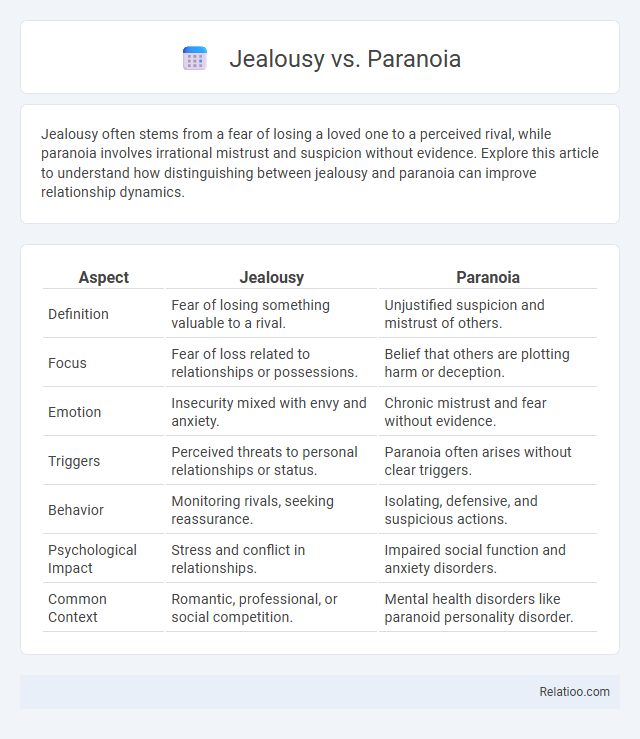Jealousy often stems from a fear of losing a loved one to a perceived rival, while paranoia involves irrational mistrust and suspicion without evidence. Explore this article to understand how distinguishing between jealousy and paranoia can improve relationship dynamics.
Table of Comparison
| Aspect | Jealousy | Paranoia |
|---|---|---|
| Definition | Fear of losing something valuable to a rival. | Unjustified suspicion and mistrust of others. |
| Focus | Fear of loss related to relationships or possessions. | Belief that others are plotting harm or deception. |
| Emotion | Insecurity mixed with envy and anxiety. | Chronic mistrust and fear without evidence. |
| Triggers | Perceived threats to personal relationships or status. | Paranoia often arises without clear triggers. |
| Behavior | Monitoring rivals, seeking reassurance. | Isolating, defensive, and suspicious actions. |
| Psychological Impact | Stress and conflict in relationships. | Impaired social function and anxiety disorders. |
| Common Context | Romantic, professional, or social competition. | Mental health disorders like paranoid personality disorder. |
Understanding Jealousy: Definition and Roots
Jealousy is an emotional response triggered by perceived threats to a valued relationship, rooted in fear of loss and insecurity. It often stems from past experiences, attachment styles, and low self-esteem, influencing how you interpret interactions with others. Understanding these underlying causes helps you manage jealousy constructively and differentiate it from paranoia or unjust accusations.
What Is Paranoia? Key Characteristics
Paranoia is a psychological condition characterized by intense, irrational distrust or suspicion of others, often without sufficient evidence. Key characteristics include persistent beliefs that others are plotting harm, exaggerated feelings of persecution, and heightened vigilance. Unlike jealousy, which centers on fear of losing something valued, and accusations, which are explicit claims of wrongdoing, paranoia involves a pervasive mindset affecting perception and judgment.
Emotional Triggers: Jealousy vs Paranoia
Jealousy often stems from fear of losing something valuable, such as a relationship, triggering emotions like insecurity and envy, while paranoia arises from irrational distrust and suspicion without concrete evidence, leading to heightened anxiety and fear. Your emotional response to jealousy is tied to perceived competition, whereas paranoia distorts reality, causing unwarranted suspicion of others' intentions. Recognizing these distinct emotional triggers can help in managing feelings before they escalate into accusation or conflict.
Common Causes Behind Jealous Feelings
Jealousy often arises from insecurities related to self-esteem, fear of losing a valued relationship, and perceived threats from rivals, while paranoia involves irrational distrust and exaggerated beliefs about others' intentions. Accusations typically stem from these underlying feelings, manifesting as direct confrontations or blame based on suspicion rather than evidence. Understanding that low self-confidence, past betrayals, and lack of communication are common roots can help address and mitigate these emotional responses.
Factors That Fuel Paranoia
Factors that fuel paranoia often include deep-seated insecurities, past experiences of betrayal, and a heightened sensitivity to perceived threats. Your mind may amplify minor social cues or ambiguous behaviors, interpreting them as deliberate acts of hostility or deceit. Understanding these triggers helps differentiate paranoia from jealousy or baseless accusations by recognizing the emotional and cognitive distortions involved.
Behavioral Differences: How Jealousy and Paranoia Manifest
Jealousy typically manifests as insecurity and fear of losing something valuable, often leading to protective or possessive behaviors toward relationships. Paranoia involves irrational suspicion and mistrust, causing individuals to perceive threats or conspiracies without concrete evidence. Accusations arise when these feelings prompt direct blame, with jealousy-driven accusations focusing on rivals, while paranoia-induced accusations target perceived hidden enemies or betrayals.
Impact on Relationships: Jealousy Compared to Paranoia
Jealousy typically stems from a fear of losing someone important and can lead to possessiveness, creating tension and mistrust in relationships. Paranoia involves irrational suspicions that your partner is being unfaithful or deceptive, often causing severe emotional distress and communication breakdowns. Understanding these differences helps you address underlying issues effectively to foster healthier, more trusting relationships.
Coping Strategies for Jealousy
Coping strategies for jealousy involve recognizing emotional triggers and implementing mindfulness techniques to reduce irrational thoughts, while fostering open communication to address insecurities constructively. Cognitive-behavioral approaches help individuals reframe negative assumptions and promote self-esteem, distinguishing jealousy from paranoia and unfounded accusations. Developing emotional regulation skills and seeking support through therapy or social networks enhances resilience against jealousy-driven conflicts.
Managing and Overcoming Paranoia
Paranoia often involves irrational distrust and suspicion that can damage relationships and mental health if left unmanaged. Your focus should be on grounding your thoughts with evidence, practicing mindfulness, and seeking cognitive behavioral therapy to challenge and reframe paranoid beliefs. Developing strong communication skills and building emotional resilience empowers you to overcome paranoia, reducing its negative impact on your well-being.
When to Seek Help: Recognizing the Warning Signs
Jealousy becomes concerning when it triggers obsessive thoughts or irrational fears that disrupt daily life, while paranoia involves persistent distrust that leads to isolation or aggressive behavior. Accusation without evidence can damage relationships and escalate conflicts, signaling a need for professional support. You should seek help if these feelings intensify, interfere with your well-being, or cause persistent mistrust and false claims.

Infographic: Jealousy vs Paranoia
 relatioo.com
relatioo.com